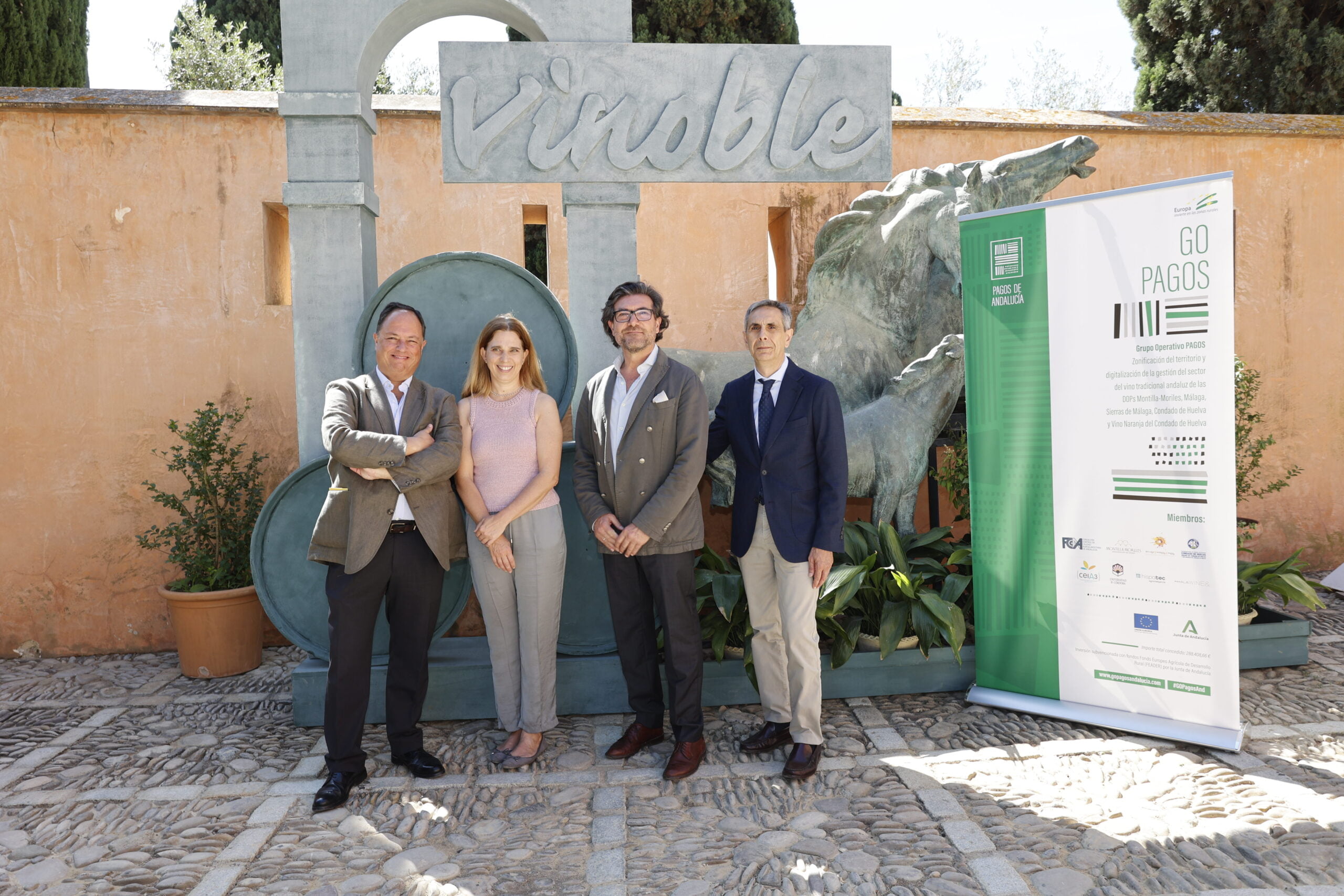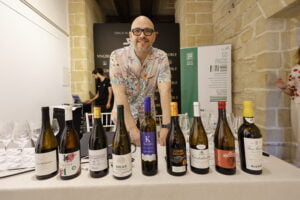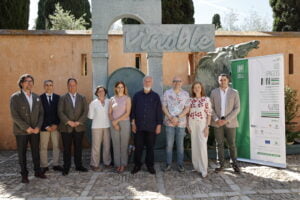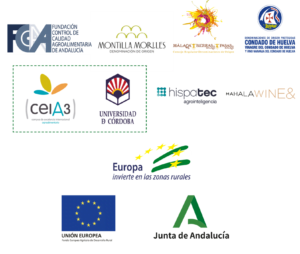
- The main purpose of the GOPAGOS Operative Group is to provide the participating PDOs with an empirical classification and definition of the territory, adding value to the territorial division and, therefore, to the wines produced there.
Download images: CLICK HERE
Jerez, 27 May 2024.- The GOPAGOS Operative Group has presented the methodology to develop a new vineyard classification in the PDOs Montilla-Moriles, Malaga and Sierras de Malaga, and Condado de Huelva and Vino Naranja del Condado de Huelva.
The results of the research work carried out by this Operative Group were presented during the tasting sessions of Vinoble International Wine Fair 2024 by Pablo Bresó, a technician from the Andalusian Foundation for the Control of Agri-Food Quality (FCCAA); Enrique Garrido, general secretary of the DOs Montilla-Moriles and Vinagre de Montilla-Moriles; Fco. Javier Aranda, general secretary of the Regulatory Board of the DOs Málaga, Sierras de Málaga and Pasas de Málaga; and Antonio Izquierdo, general secretary of the Regulatory Board of the DOs Condado de Huelva, Vinagre del Condado de Huelva and Vino Naranja del Condado de Huelva.
During the presentation, Santiago Carrillo, sommelier at El Corral de La Morería (Madrid), led a tasting to explore the different territories included in this research and to understand the characteristics of each terroir through the wines.
The GOPAGOS Operative Group – Territorial Classification and Management Digitalisation of the Traditional Wine Sector of the PDOs Montilla-Moriles, Málaga, Sierras de Málaga, Condado de Huelva and Vino Naranja del Condado de Huelva aims to establish an empirical territorial classification and management digitalisation of the traditional Andalusian wine sector of the appellations of origin concerned, in order to focus on the value of each territory and the wines produced there.
The aim of this project is to recover several historic pagos (vineyard sites) in Montilla-Moriles and Condado de Huelva and to include Manilva in the classification already adopted for other parts of the PDO Málaga and Sierras de Málaga. In order to define each area, the group examined all the available historical and cadastral documentation before carrying out a characterisation of the territory based on edaphoclimatic and cultural criteria.
«GOPAGOS was set up to reinforce the importance of the terroir in the viticulture of the appellations of origin concerned,» says the Operative Group. «The research and experiments that have been carried out demonstrate the influence of climatic and soil factors on the quality of the pagos, and now make it possible to establish a clear relationship between the characteristics of the environment and the development of the vine, highlighting the need for precise management based on scientific data of the pagos.»
Edaphological analysis for objective classification
For the soil analysis, the Edaphology research group of the Agronomy Department at the University of Cordoba conducted a detailed study of the soil in each PDO, based on regional and national lithological and soil maps. This analysis, together with subsequent field visits and information obtained from growers and from samples taken from the various sites, provided the basis to understand the edaphic characteristics of each area.
A total of 19 soil profile evaluations were carried out by digging soil pits in Manilva (PDO Málaga and Sierras de Málaga), PDO Condado de Huelva, and Montilla-Moriles. Samples were also taken from 78 horizons of interest and 35 auger borings to verify the mapping information. These samples were analysed in the laboratory for various parameters such as moisture, soil texture, carbonate content, organic matter and pH, among others, providing a solid basis for identifying and demarcating the historical pagos. This study is essential to understand the distinctive characteristics of each territory and the results help to define the classification in each appellation of origin.
In addition, the AGR-124 Research Group on Remote Sensing and Precision Agriculture at the University of Córdoba has incorporated all the graphic bases in the vineyard registry of the DOs concerned into a geographical information system. This system will provide the graphical basis for the project’s activities and will be used to support the subsequent digital analysis required.
An innovative digital tool for the future
Climate data is also being collected and analysed with a view to incorporating it, along with soil data, into a digital app. This tool will provide a dynamic and updatable territorial information system for the Andalusian wine sector, protected by the appellations of origin concerned. For the GOPAGOS Operative Group, «this tool will allow continuous access to up-to-date information on climatic conditions, selected climate indicators for vineyard characterisation and extended classification with edaphological criteria, aspects and permanent slopes.»
This app, which is still in the testing phase, is intended to become «a tool to facilitate decision-making in the wine sector», thus developing production strategies aimed at improving the quality of grapes and wines, based on a new territorial classification of these appellations of origin, as well as serving as a system to analyse the influence of climate change.
Tasting the different pagos in the study area

Santiago Carrillo, sommelier at El Corral de la Morería (Madrid), led the audience in a tasting of wines made from vines grown in various areas of the territory under study. The wines were all from different pagos and had the peculiarity of being made from the local grape variety of each area: Pedro Ximénez in Montilla-Moriles, Zalema in Condado de Huelva and Moscatel in Manilva.
The tasting began in PDO Condado de Huelva: Pago de la Dehesilla and Majuelo, with the wine Colección Descubrimiento 2021 (Marqués de Villalúa); Pago El Pino with Innocence 2022 (Bodegas Infante) and Pago Los Carrascales with Líbero 2020 (Bodegas Contreras Ruiz). The journey continued with two different areas of Manilva, in DO Málaga and Sierras de Málaga: first with the wine Nilva 2021 (Bodega Nilva) and then with Kalma 2022 (Bodegas Manilva). Four wines from the PDO Montilla-Moriles rounded off the tasting. First, Pago Cerro del Majuelo with Ximenium 2022 (Bodegas El Monte) and then a tour of 3 sub-pagos in Pago Benavente: Cuestablanca 2022 (Bodega Lagar Blanco) which shares its name with the sub-pago; the Cañada Navarro sub-pago, with El Pretil 2022 (Los Insensatos de la Antehojuela); and finally, the sub-pago Cerro Macho with Tres Miradas 2020 (Bodegas Alvear).
GOPAGOS Operative Group

GOPAGOS is committed to recovering, organising and characterising the historic vineyards and areas of special interest of the PDOs Montilla-Moriles, Málaga and Sierras de Málaga, and Condado de Huelva and Vino Naranja del Condado de Huelva. Based on factual data, this work will help to handle these vineyards differently and to highlight the origin of their grape production. The aim is to provide a scientific basis for the demarcation of the territory, identifying the pagos according to edaphoclimatic, cultural and human criteria. The research will also validate the influence of climatic and edaphological factors, including biodiversity, coexistence of crops and indigenous vegetation on the boundaries.
The project also includes the creation of a dynamic, updatable and technology-based tool that can be used by the sector for decision-making and to develop production strategies aimed at improving grape and wine quality. This tool, based on a new territorial classification of these appellations of origin, also serves as a system to analyse the influence of climate change.
In practice, the PDOs included in this Operative Group lack recognition of their historical pagos on the basis of their quality or special features that give added value to the product. Moreover, some of the existing information (documentary, edaphological, agro-climatic, etc.) had not been properly compiled and organised and also needed to be expanded and updated.
In the case of the PDO Montilla-Moriles, the division was administrative, based on existing infrastructures such as roads and paths, or on natural boundaries. In the case of the PDOs Málaga and Sierras de Málaga, the classification of the pagos took place around the 18th century, with the identification of early, medium and late areas, based on climatic data and the time of harvest. For the PDOs Condado de Huelva and Vino Naranja del Condado de Huelva, although the traditional pagos have always been known to growers and producers, there is no evidence of any land classification.
The GOPAGOS Operative Group – Territorial Classification and Management Digitalisation of the Traditional Wine Sector of the PDOs Montilla-Moriles, Málaga, Sierras de Málaga, Condado de Huelva and Vino Naranja del Condado de Huelva is formed by the Andalusian Foundation for the Control of Agri-Food Quality (FCCAA), PDO Montilla-Moriles, PDO Málaga, PDO Sierras de Málaga, PDO Condado de Huelva, PDO Vino Naranja del Condado de Huelva, International Campus of Excellence in Agri-food (ceiA3), University of Córdoba, Hispatec ERPAgro and MAHALA\Wine&.
The work of the Operative Group will continue until the end of 2024 and is funded by the Andalusian Regional Government through the European Agricultural Fund for Rural Development (EAFRD) for a total of €288,408.66.

#GOPagosAnd




